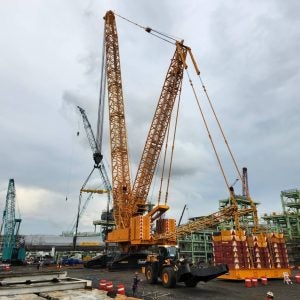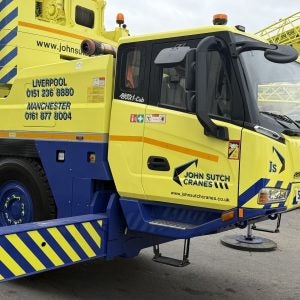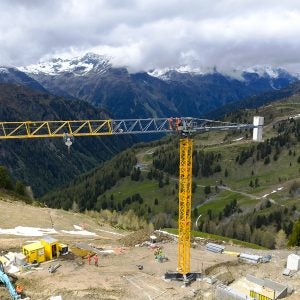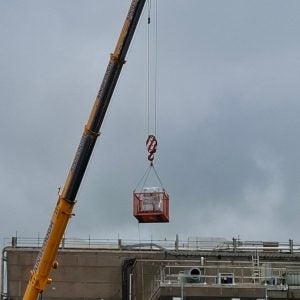Delegates came from the UAE, Saudi Arabia, and other Gulf Cooperation Council countries, Europe, the USA and Asia. The event, which attracted 170 people, was organised by Wilmington Conferences, in association with Cranes Today and sister magazine Hoist.
Over the two day conference, a broad consensus emerged that safety procedures on some types of construction sites were below a minimum level. “We are not being honest,” said Saeed Malik, general manager of Saudi Arabia based construction contractor Al Suwaidi Equipment & Transport Co. “People are putting a cost on lives. Fear makes them put it under wraps. This is not going to bring progress: we need to face it.”

Delegates at Middle East Cranes
The problem comes down to a ‘quickly rather than safely’ attitude on many job sites, according to David Semple, Manitowoc Crane Group Middle East sales manager and general manager. This mentality “relies on short term thinking, limited enforced regulations in design and operation, and a desire to spend as little as possible; these pressures will force people to put anything on a job site,” he said. It can also lead to sourcing cranes that have capacities that are too low for the requirements of the job, he said.
During one of many discussions, keynote speaker Alex Mullins, managing director of Al Jaber, said that part of the problem comes from the unique social structure of the country: “We face the problem here that we are an open community. People are coming here from all over the world, and there is no idea of BS 7121.”

Abu Dhabi, UAE Ministry of Labour officials Khaled Al Menhali (left) and Mohammed Salem Sawaad, with Roland Verreet of Wire Rope Technology
“I know of one instance where a certain training provider was issuing competence certificates to individuals on someone else’s recommendation, without even meeting the candidate. I know of another instance where an accredited testing company’s representative was issuing yearly crane examination certificates after just looking at a tower crane from the ground for a few minutes,” he said.
“We need help from the municipality as well as the crane and safety conscious construction companies to eliminate these wrong and dangerous practices,” he said. Mahdiyone proposed establishing a trade association to set a better standard of training for crane operators, and to share experiences and data.

Hosam Hashem (left), Saudi Aramco heavy lift engineer, and Imad Al-Jamal, of the UAE Contractors’ Association, on the podium at Middle East Cranes
“I think it’s very important that we and all the other constructors come forward and talk like this—that’s what is going to make it happen” said Bishoy Azmy, deputy general manager, Al Shafar General Contracting.
By the end of the conference, about 15 delegates from manufacturers, construction contractors and crane rental companies signed up to a new safety forum. Readers who are interested in participating should contact the editor.
The conference covered potential solutions, as well as problems.

Lina Qudah, Dubai Accreditation Centre head of accreditation decisions section, speaks with delegates
Klaus Binder, project manager at tower crane manufacturer Liebherr Biberach, offered five recommendations to reduce tower crane accidents: regularly inspect cranes; develop a supervisory organisation such as an employers’ liability insurance association; appoint safety officers, and have regular inspections of them; use trained erection and servicing personnel, and use trained operators.
According to Alex Mullins of Al Jaber, currently too much pressure focuses on the crane operator. “The crane operator is so often blamed for an accident, but there are other controlling organisations who are responsible.”






